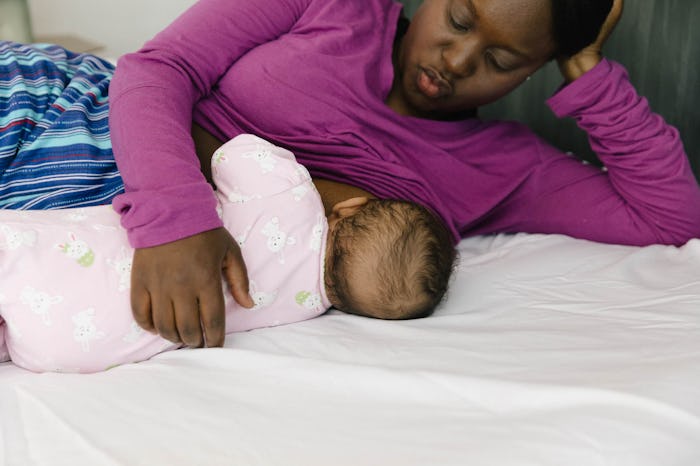Any woman who's nursed her baby knows that breastfeeding is a powerful biological event, one that keeps your body working day and night. If you're still breastfeeding your little one, but considering having another, you might wonder, can breastfeeding affect trying to conceive? According to an article in the Annals of Medicine, lactational amenorrhea — the fact that you stop ovulating while lactating — is a potent contraceptive. Basically, breastfeeding is nature's birth control. The article noted that women in traditional hunter-gatherer societies tended to have children every four years, with prolonged breastfeeding probably acting as natural contraception.
Keep in mind that these ladies didn't have breast pumps, didn't go back to work, and probably put off supplementing with other foods as long as possible. All those habits matter. One study showed that pumping, instead of exclusively suckling, increased fertility. According to La Leche League, any abrupt changes in your breastfeeding routine can increase fertility. I'm guessing that Nomadic hunter-gatherer tribes probably didn't have schedules that required the baby to sleep through the night, so the baby could spend more time at the breast. According to an article in Clinical Perinatology, the more frequently you breastfeed, the longer you'll remain infertile.
Lactational amenorrhea is a method of contraception recognized by the Centers for Disease Control and Prevention (CDC). However, if you plan to use lactation as birth control, there are some things you should know. First, you must not be getting your period. Second, you must be "fully or nearly fully breastfeeding," meaning that you breastfeed every four to six hours, with no longer stretches in between. Finally, you must be less than six months postpartum.
According to Options for Sexual Health, the lactational amenorrhea method (LAM) is 98 to 99 percent effective as birth control as long as you follow the guidelines above. If you get your period, however, it's time to buy some condoms. Likewise, after six months have passed, the method is less reliable.
According to Kelly Mom, as long as your periods are regular — and after the first six months postpartum, they've often made their full, glorious return — you can probably still conceive while breastfeeding. In fact, many women do. Though breastfeeding typically delays ovulation, it won't stop time. According to La Leche League, almost all fully-breastfeeding mothers are period-free for six glorious months. If you're itching to be pregnant again as soon as possible, La Leche League recommends not nursing for a straight 24 hours. In some women, that alone is enough to bring back fertility. Also keep in mind that the World Health Organization recommends waiting at least 24 months after a live birth before trying to conceive again, because waiting 24 months reduces health risks for mom and baby.
In terms of her fertility, every woman is an individual. You might have no problem conceiving while breastfeeding, or you might struggle. If you have questions about LAM or conceiving while nursing, always consult your doctor.
